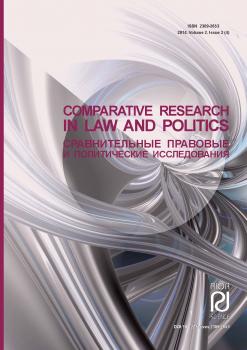The article is devoted to Amicable Dispute Resolution (ADR). The essence of amicable means of dispute resolution and the basic forms of ADR (negotiation, mediation, arbitration) are considered. Author treats these forms as the first class justice. In his point of view mediation and the other basic forms of ADR are "the Complementary Forms of Justice". Then there is the detailed analysis focuses on the most important law acts concerning mediation in civil matters in Poland and the Russian Federation. The comparison presents the essential differences between the Polish and the Russian regulations. In conclusion, the five mainly motives of using ADR are noticed. The broader functions of ADR connected not only the classical regulatory, protective or harmonizing issues are shown.The article is devoted to Amicable Dispute Resolution (ADR). The essence of amicable means of dispute resolution and the basic forms of ADR (negotiation, mediation, arbitration) are considered. Author treats these forms as the first class justice. In his point of view mediation and the other basic forms of ADR are "the Complementary Forms of Justice". Then there is the detailed analysis focuses on the most important law acts concerning mediation in civil matters in Poland and the Russian Federation. The comparison presents the essential differences between the Polish and the Russian regulations. In conclusion, the five mainly motives of using ADR are noticed. The broader functions of ADR connected not only the classical regulatory, protective or harmonizing issues are shown.
Amicable Dispute Resolution, conflict, negotiation,mediation, arbitration, agreement, the ComplementaryForms of Justice.
I. Amicable means of dispute resolution.
The traditional means of dispute resolution in short include fight, force or coercion. A conflict is viewed only as a struggle. These responses have resulted in the winlose, right — wrong perspective of conflict resolution. The parties are adversaries, focus on who is right, who is more powerful, who will be a winner. In this case, the main legal method to resolve disputes is litigation procedure [1, p. 4–5]. In contrast, Amicable/Alternative Dispute Resolution (ADR) identifies a group of forms (processes) through which conflicts (disputes) and cases are resolved outside of formal litigation procedures usuallyby negotiation, mediation or arbitration [2, p. 24–25]. ADR avoids traditional means of resolving disputes and focuses on new and creative methods to achieve the main purpose which is the win-win solution (mutual acceptable and profitable agreement). They rely on interested-based and relational-based paradigms of conflict solving which offer the most collaboration and integrative methods. It is also recognized as the most productive conflict-handling behavior. These methods, which increases the reconciliation of interests and needs, are also identified as the most prospective and effective system of dispute resolution. If the primary goal of reconciling interests in not successful (lack of agreement), then rights determination should be next, leaving a court resolution as the last resort [3, p. 6].
1. Kovach K.K., Mediation. Principles and Practice. Third edition, Saint Paul 2004, p. 4-5.
2. Zienkiewicz A., Studium mediacji. Od teorii ku praktyce Warszawa, 2007, p. 24-25.
3. Kovach K.K., op. cit., p. 6.
4. Riskin L., Westbrook J., Guthrie Ch., Heinsz T., Reuben R., Robbennolt J., Dispute Resolution and Lawyers. Abridged Edition. Third Edition, Saint Paul 2006, p. 99.
5. Compare: Riskin L., Westbrook J., Guthrie Ch., Heinsz T., Reuben R., Robbennolt J.,op.cit., p. 13.
6. Zienkiewicz A., op.cit., p. 44-46, 96-123.
7. More information concerning the different objectives of mediation, additionally see: Riskin L., Understanding Mediator’s Orientations, Strategies and Techniques: A Grid for the Perplexed, 1 “Harvard Negotiation Law Review” 1996, p. 7-51.
8. Compare: Auerbach J., Justice Without Law? Resolving Dispute Without Lawyers, New York, 1983.
9. Compare: Waldman E. Identifying Role of Social Norms in Mediation: A Multiple Model Aproach, 48 “Hastings Law Journal” 1997, p. 703-769
10. Broader about arbitration see for example: Rau A., Sherman E., Peppet S., Processes of dispute resolution. The role of Lawyers. Third edition, New York 2002, p. 597-876.
11. Mediation: Principles and Regulation in Comparative Perspective, edited by Hopt K.J., Steffek F., Oxford 2013.
12. The Polish Code of Civil Procedure - Act of 23 April 1964, Journal of Laws No 16, item 93, as amended.
13. URL: http://eur-lex.europa.eu/LexUriServ/LexUriServ.douri=OJ:L:200:136:0003:0008:En:PDF (20.12.2013).
14. URL: http://www.mediacia.com/files/Documents/ Law_eng1_simple.pdf (20.12.2013). the Articles 14, 17,18,19 of the Russian Federal Law on Mediation.
15. URL: http://ms.gov.pl/pl/dzialalnosc/mediacje/spoleczna-rada-ds-alternatywnych-metod-roz wiazywania-konfliktow-i-sporow/o-radzie/ URL: http://ms.gov.pl/pl/dzialalnosc/mediacje/publikacje-akty-prawnestatystyki/(20.12.2013).
16. Zienkiewicz A. Standardy prowadzenia mediacji i post powania mediatora - uchwalone przez Społeczną Radę ADR przy Ministrze Sprawiedliwości, “Studia Prawnoustrojowe” 2012, nr 18, p. 185-200.
17. URL: http://ms.gov.pl/pl/dzialalnosc/mediacje/publikacje-akty-prawne-statystyki/ (20.12.2013).
18. Kalisz A., Zienkiewicz A., Mediacja Sądowa i Pozasądowa. Zarys wykładu, Warszawa, 2009, p. 68.
19. Baruch Bush R., Folger J. The promise of mediation. The Transformative Approach to Conflict, New and Revision Edition, San Francisco 2005.
20. Shamlikashvili T., Mediation in the neighbouring countries: the case of Russia, Brussels 2011, p. 15.
21. Bobrowicz M. The development of mediation in Poland, Brussels, 2011.
22. Hendley K., The Introduction of Mediation to Russia, National Council for Euroasian and East European Research, Seatle, 2012, p. 10-11; URL: http://www.ucis.pitt.edu/nceeer/2012_826-18h_Hendley2.pdf (20.12.2013).
23. Usoskin S., New Legal Regime for Mediation in Russia; URL: http://cisarbitration.com/2010/12/08/new-legal-regime-formediation-in-russia-starting-from-jan-1-2011/ (20.12.2013).
24. Imperati S., Mediator practice models: the intersection of ethics and stylistic practices in mediation, 33 “Willamette Law Review” 1997, p. 707-745.
25. M. Araszkiewicz, A. opatkiewicz, A.Zienkiewicz, Factorbased Parent Plan Support System, [w:] ICAIL ‘13: Proceedings of the Fourteenth International Conference on Artificial Intelligence and Law, ed. E. Francesconi, B. Verheij, New York, USA 2013, s. 171-175.
26. Lazarev A., Makhonin Y., Mediation framework adopted in Russia; URL: http://www.lexology.com/library/detail.aspx?g=4d17e726-6b96-41fe-8b93-244b403c0979 (20.12.2013).
27. Czepik A., Mediacja s dowa w sprawach cywilnych w Federacji Rosyjskiej, Kwartalnik ADR “Arbitra i mediacja”, Nr 4(20)/2012, p. 35.
28. Czepik A. op. cit., p. 36.
29. Rumyantsev S., Russian Federation: Russia Mediates Everything - New Law At A Glance. URL: http://www.mondaq.com/x/124344/Corporate/Russia+Mediates+Everything+New+Law+At+A+Glance (20.12.2013).
30. Lazarev A., Makhonin Y. Mediation framework adopted in Russia; URL: http://www.lexology.com/library/detail.aspx?g=4d17e726-6b96-41fe-8b93-244b403c0979 (20.12.2013).
31. Riskin L., Westbrook J., Guthrie Ch., Heinsz T., Reuben R., Robbennolt J., op.cit., p.10.
32. Zienkiewicz A. Medіacіya yak fopma zdіysnennya pravosuddya // Medіacіya yak procedura vregulyuvannya sporіv shlyahom dosyagnennya konsensusu / Іnstitut zakonodavstva Verhovnoї Radi Ukraїni, Myunhens'kiy Іnstitut shіdnoєvropeys'kogo prava. Kiїv, 2011. C. 13-34.
33. Zienkiewicz A. Mediation als eine Form der Justiz // Mediation als Verfahren konsensualer Streitbeilegung. Die deutsche, polnische und ukrainische Perspektive, edited by Tina de Vries, Frankfurt am Main 2012, p. 3-22.
34. Reuben R. Constitutional Gravity: A Unitary Theory of Alternative Dispute Resolution and Public Civil Justice, 47 “University of California Law Review 2000, p. 949-1104.
35. Zienkiewicz A., Koncepcja sądu otwartego - wzmocnienie pluralizmu form wymiaru sprawiedliwości // Mediacja - nowa droga rozwiązywania sporów, pod red. Rękas A., Warszawa 2011, s. 29-47.
36. Morawski L., Główne problemy współczesnej filozofii prawa. Prawo w toku przemian, Warszawa 1999, s. 194.
37. Zienkiewicz A. Studium mediacji, op. cit., p. 268-271.
38. Fuller L. Mediation - Its Forms and Functions, 44 “Southern California Law Review”, 1971, p. 305-339.





